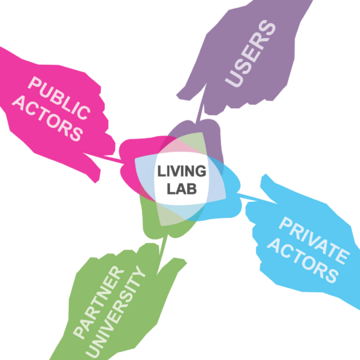LED2LEAP Living Labs: Difference between revisions
No edit summary |
No edit summary |
||
| Line 1: | Line 1: | ||
[[File: | [[File:Living_Lab_Graphic.png|thumb|360px|]] | ||
== Introduction to Living Labs == | == Introduction to Living Labs == | ||
The Living Labs are part of a community learning model that brings the groups of actors in a community together, to form their landscape. The methods and tools learned in the Online Seminar will be able to be explored and tested in the Living Labs, by the group of student who are local to that community. Each partner university has created their own Living Lab and itinerary for lab meetings, which will run parallel with the Online Seminar. Some of the engagements with the Living Labs include - | |||
'''Participatory Action Research''' - sessions including PAR will involve active methods for engaging the community in the lab and in the landscape, in order to gather data about their space. | |||
'''CoDesign''' - students will work together with the community, bringing stakeholders in on key points of the design process, to increase the functionality and sustainability of the design. | |||
'''Community Feedback''' - methods can be tested for gaining insightful critique from stakeholders, to understand the effectiveness of the design. | |||
Revision as of 11:30, 6 March 2020
Introduction to Living Labs
The Living Labs are part of a community learning model that brings the groups of actors in a community together, to form their landscape. The methods and tools learned in the Online Seminar will be able to be explored and tested in the Living Labs, by the group of student who are local to that community. Each partner university has created their own Living Lab and itinerary for lab meetings, which will run parallel with the Online Seminar. Some of the engagements with the Living Labs include -
Participatory Action Research - sessions including PAR will involve active methods for engaging the community in the lab and in the landscape, in order to gather data about their space.
CoDesign - students will work together with the community, bringing stakeholders in on key points of the design process, to increase the functionality and sustainability of the design.
Community Feedback - methods can be tested for gaining insightful critique from stakeholders, to understand the effectiveness of the design.
